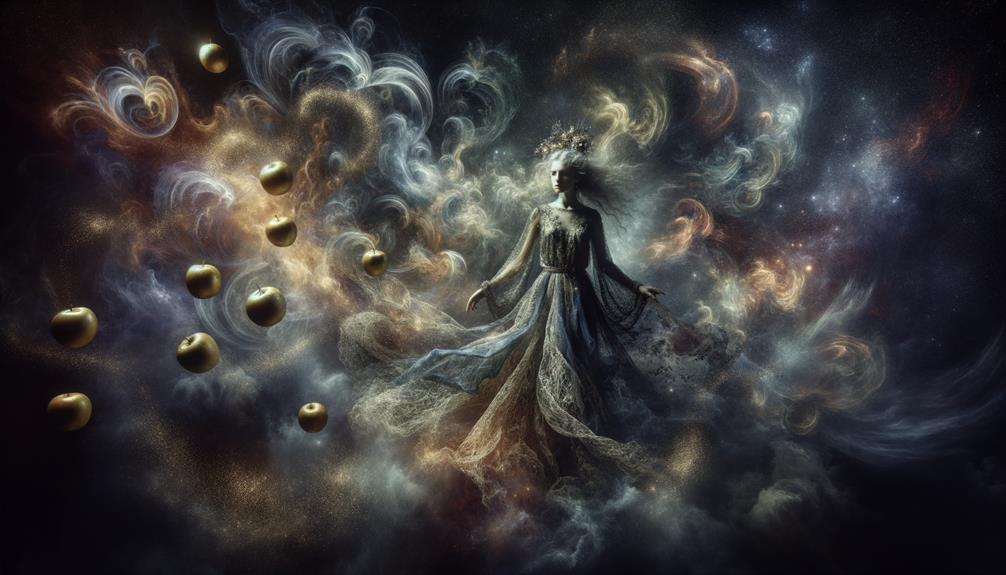
Goddess of Discord: Embracing Strife in Modern Times

The narrative of the goddess of chaos, Eris, serves as a profound reminder of how strife and conflict are woven into the fabric of human existence. In the tapestry of Greco-Roman mythology, she emerges as a crucial character whose actions not only bear witness to her role as the personification of discord, but also highlight the implications of conflict in broader societal contexts. As we explore the concept of embracing discord in modern times, it becomes apparent that understanding Eris's legacy is essential to navigating today's complexities.
In this article, we delve deep into Eris's mythological roots and her impact on history and literature, ultimately linking her significance to modern interpretations of discord. By doing so, we aim to foster a conversation on the importance of conflict, discussion, and disagreement in our lives today. This exploration will shed light on how the lessons derived from Eris not only help us confront our internal struggles but also guide us in cultivating a more harmonious society amidst inevitable strife.
- The Mythological Roots of Eris
- Eris: The Catalyst of Conflict
- The Golden Apple and the Triggering of the Trojan War
- Strife in Literature: Eris Through the Ages
- Modern Interpretations of Discord
- Embracing Conflict: Lessons from Eris
- The Role of Disagreement in Society
- Cultivating Harmony Amidst Strife
- Conclusion: The Relevance of Discord Today
The Mythological Roots of Eris
Eris, often referred to as the goddess of chaos, finds her origins in Greek mythology through the works of poets like Hesiod. Traditionally identified as the daughter of Nyx, the personification of night, and sister to Ares, the god of war, Eris embodies the tumult of human emotions and the chaos that arises from conflict. As a mythological figure, she represents an aspect of existence that is often overlooked in favor of peace and harmony. However, her very essence is tied to the natural order of things, which includes the existence of strife.
Hesiod's "Theogony" describes her as a figure whose mere presence can disrupt even the most peaceful gatherings, making her not just a harbinger of conflict but a necessary component for growth and change. This duality reflects the nature of chaos and how it influences human endeavors. As we trace her story through antiquity to modern societal structures, it becomes evident that Eris’s influence persists in various forms, challenging accepted norms and encouraging discourse around the most contentious issues.
Eris: The Catalyst of Conflict
In ancient narratives, Eris's role as a catalyst of conflict manifests in pivotal moments that alter the course of human history. According to myth, her act of tossing the golden apple at the wedding of Peleus and Thetis can be seen as not merely an act of malice but as a profound reminder of the complexities of desire, beauty, and rivalry. The apple, inscribed with the phrase "For the most beautiful", symbolically encapsulates the qualities of discord that she represents—jealousy, competition, and the innate human desire for validation.
This single action precipitated the judgment of Paris and set in motion the events that would lead to the Trojan War, one of the most significant conflicts in Western literary history. Eris's character challenges the ideals of peace by showcasing how even trivial actions can spiral into large-scale consequences. Through this lens, the goddess of chaos serves not only as a figure to study but also challenges us to consider how we perceive and respond to conflict in our own lives.
The Golden Apple and the Triggering of the Trojan War
The fateful moment of the golden apple reveals the goddess of chaos as an instigator of desires entwined with envy and strife. When Eris was excluded from the wedding of Peleus and Thetis, her subsequent action of tossing the apple among the guests illustrates how exclusion can lead to conflict. Hera, Athena, and Aphrodite's desperate claim over the apple showcases the deep-seated rivalry and competitive nature that often accompanies human relationships.
The decision to let Paris, a mere mortal, judge the beauty of the goddesses introduces a crucial element of chaos into the equation. His choice to award the apple to Aphrodite, who promised him the love of the most beautiful mortal, Helen of Troy, highlights the intertwining of personal desires with the broader implications of war. The Trojan War itself becomes a battleground not just of armies but of personal grievances and divine meddling, embodying the chaotic energy that Eris represents. In this context, Eris emerges not only as a source of conflict but as a mirror reflecting our own human struggles and aspirations.
Strife in Literature: Eris Through the Ages
Throughout history, Eris has continued to inspire works of literature, serving as a potent symbol of strife and chaos. Her influence is evident in various narratives across genres, where authors have explored themes of discord and its consequences in innovative ways. From ancient Greek tragedies to contemporary novels, Eris's character resonates with readers, often representing the tumultuous emotions that govern human interactions.
In classical literature, her role is often associated with the implications of human folly and the pain of unfulfilled desire. The stories that ensue from her actions, especially the prolonged suffering resulting from the Trojan War, depict conflict as a necessity for understanding and growth. Even in modern contexts, Eris serves as a metaphor for struggles people face—both internally and externally. This continuous invocation of her spirit attests to our collective grappling with the concept of chaos in various facets of life.
Modern Interpretations of Discord
In contemporary society, the interpretation of discord is multifaceted, encompassing political, social, and personal realms. As we navigate through increasingly polarized environments, the lessons inadvertently taught by Eris resonate deeply. The notion of conflict as an essential component of growth is particularly relevant today, as individuals and communities grapple with differences in opinions and values.
Modern thinkers have embraced the idea that disagreement can lead to productive dialogue and innovation. Just as Eris initiated pivotal moments in myth, our engagements in conflict can spark crucial conversations that challenge the status quo. This perspective encourages individuals to view discord not as a deviation from harmony but as a necessary aspect of progress. By embracing these conflicts, we foster more profound understanding and connection, echoing Eris's transformative influence throughout history.
Embracing Conflict: Lessons from Eris
Examining the legacy of the goddess of chaos offers valuable insights into how we can embrace conflict in our lives. Rather than shying away from disagreements, we can learn to appreciate the role of discord as a catalyst for personal development. Eris teaches us that tensions and struggles often lead to growth and resilience—qualities essential for navigating an increasingly complex world.
Through her mythos, we are reminded that discomfort can be an opportunity for reflection, fostering self-awareness and deeper connections with others. By analyzing the dynamics of strife, we can build frameworks that promote constructive conflict resolution and dialogue. This not only honors the potential of Eris's gifts but also facilitates a deeper understanding of our collective human experience.
The Role of Disagreement in Society
Adopting a holistic perspective on disagreement is crucial for societal growth. Just as Eris's presence in mythology serves as an urgent call for reflection, our interactions with conflict require a similar approach. Learning to engage with differing views strengthens communal ties and underscores the richness of diverse perspectives. Societies benefit from open dialogues that embrace contrasts, as these exchanges can lead to innovative solutions and inspire change.
Moreover, acknowledging disagreement as a natural part of human relationships helps dismantle toxic narratives that often surround conflict. By promoting a culture of openness and understanding, we can collectively transform the challenges of discord into stepping stones toward more cohesive communities. In this light, Eris becomes a revered figure not just of chaos, but of constructive change arising from tumultuous beginnings.
Cultivating Harmony Amidst Strife
Ultimately, the challenge lies in learning to cultivate harmony even in the midst of strife. The identity of Eris as the goddess of chaos serves as a paradox, illustrating that balance can be achieved not through the absence of conflict but by understanding its role in our lives. Developing the skill to navigate discord effectively demands insight, empathy, and a willingness to confront difficult discussions.
Tools for fostering harmony entail active listening, empathetic engagement, and cultivating respect for varying viewpoints. By embracing the lessons from Eris, we gain the capacity to turn conflict into opportunities for collaboration. Creating spaces for dialogue enriches buy-in and commitment from diverse individuals, ultimately leading us toward collective goals grounded in respect and unity.
Conclusion: The Relevance of Discord Today
As we navigate the complexities of modern existence, the figure of Eris remains profoundly relevant. The goddess of chaos serves as a reminder of the vital role that discord plays in human affairs. Embracing conflict, rather than fearing it, allows us to foster deeper connections and create lasting change in our communities. Through acknowledging the legacies of strife and the opportunities it provides, we pave the way for personal and societal growth.
By weaving the narratives of Eris into our contemporary experiences, we understand that the goddess of chaos embodies the messiness of being human. As we face challenges and conflicts in our lives and societies, let us remember that within the discord lies potential—a chance to redefine our relationships, build bridges, and cultivate harmony amidst the chaos that shapes our world today.
Did you find this article helpful? Goddess of Discord: Embracing Strife in Modern Times See more here Education.
Leave a Reply






Related posts